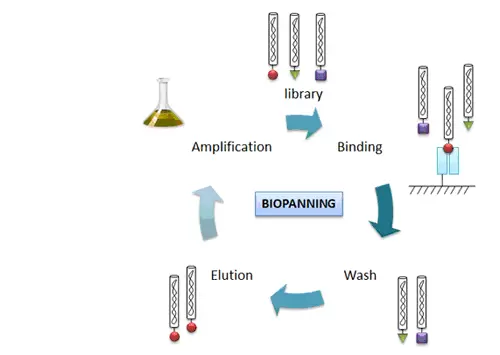
Phage Display Technology
Antibody Development via Phage Display
Express foreign peptides and proteins on the surface of filamentous bacteriophages
Phage display technology allows expression of foreign peptides and proteins on the surface of filamentous bacteriophages. This methodology is used to identify peptide ligands for a wide variety of targets by screening for the ability to bind with high affinity and specificity. Phage display has become a cornerstone method to investigate molecular interactions involving protein surfaces.
Phage Display Screening
Our partner Antibody Design Labs has developed a comprehensive line of tools and kits to facilitate and streamline antibody development using phage display technology at every stage, including discovery, generation and engineering.
Helper Phages
Helper Phages developed by ADL are characterized by their very high concentration, unique QC, and reliability making them the preferred source for phage display applications.
- High concentration > 2 x 10^12 cfu/ml
- High purity
- Gene II ORF sequence-verified
- Integrity of phage particle ssDNA validated
Phage Vectors and Phagemid Vectors
Phage Vectors and Phagemid Vectors are vectors for easy cloning, adaptable display and versatile applications. Selection of binders is a complex process depending on multiple variables and experimental conditions, making time and resources the main limiting factors for successful biopannings. Phage vectors produce a multivalent display and are best suited for peptides and scFv whereas phagemid vectors are best suited for the display of antibodies such as scFv and Fab fragments but can also be used to display peptides at a low valency.
- Multiple tags and cloning sites
- Varied display strategies
- No background expression to maintain library integrity & stability
- Inducible expression & display
- No MTA attached
Phage Display Peptide Library Kits
The premade MIM™ phage display peptide libraries are based on the fADL™-2blue phage vector. The fADL™-2blue vector is a type 3 phage display vector (Smith 1997) derived from the phage vector fd-tet (Zacher 1980). fADL2blue is well tolerated by the host and gives large colonies and small plaques, simplifying the screening of libraries and the handling of single clones.
Mammalian Antibody Expression Vectors
TGEX Vector Series for the rapid transient expression of antibody molecules in suspension cells.
Mammalian Expression Validation of phage display-generated scFv
scFv-Fc Fusion Cloning Vector for antibody validation after biopanning.
Phage Competent Cells
Highest efficiency electrocompetent cells for the generation of phage display libraries.